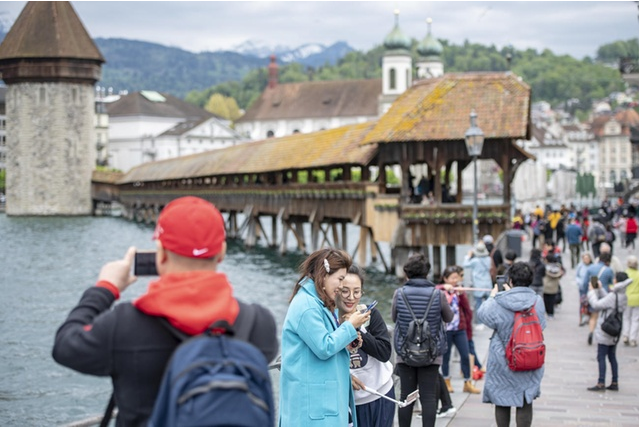Lucerne, with its iconic Chapel Bridge, is a major tourist attraction for visitors who often don’t spend the night in the city. One of the most popular destinations in Switzerland is reviewing its tourism strategy and mulling introducing coach fees in a bid to curb traffic woes and other disruptions caused by the large number of tourists it welcomes. The vast majority of visitors to Lucerne, whose tally surpasses 9 million a year (or the equivalent of 25,000 per day), do not spend the night in the central Swiss city. Groups of Asian tourists in particular often arrive by coach for a whirlwind tour of key sights before heading off to their next destination. In response to concerns voiced by locals, the city executive
Topics:
Swissinfo considers the following as important: 3.) Swiss Info, 3) Swiss Markets and News, Business, Featured, newsletter
This could be interesting, too:
Nachrichten Ticker - www.finanzen.ch writes Die Performance der Kryptowährungen in KW 9: Das hat sich bei Bitcoin, Ether & Co. getan
Nachrichten Ticker - www.finanzen.ch writes Wer verbirgt sich hinter der Ethereum-Technologie?
Martin Hartmann writes Eine Analyse nach den Lehren von Milton Friedman
Marc Chandler writes March 2025 Monthly

Lucerne, with its iconic Chapel Bridge, is a major tourist attraction for visitors who often don’t spend the night in the city.
One of the most popular destinations in Switzerland is reviewing its tourism strategy and mulling introducing coach fees in a bid to curb traffic woes and other disruptions caused by the large number of tourists it welcomes.
The vast majority of visitors to Lucerne, whose tally surpasses 9 million a year (or the equivalent of 25,000 per day), do not spend the night in the central Swiss city. Groups of Asian tourists in particular often arrive by coach for a whirlwind tour of key sights before heading off to their next destination.
In response to concerns voiced by locals, the city executive is studying a proposed fee of CHF120 ($120) for each coach that stops in the city centre, with the objective of reducing disruptions and getting tourists to contribute to infrastructure costs.
Since 2015 coaches trying to reach the major tourist sites at rush hour have been restricted to dropping off visitors and leaving immediately. Several other ideas have been floated to deal with the influx of these tourist vehicles. One of them is a popular initiative that calls for an underground parking for coaches in the north of the city that would be connected to the centre by metro.
The authorities, however, oppose the proposal for cost reasons and deem the project to be unrealistic. A study mandated by the municipality calls instead for a designated parking space in the west end, near the football stadium and a local train station.
The city plans to issue a new tourism strategy, work which will involve collecting residents’ grievances from the end of 2019, considering infrastructure needs and imposing definitive rules on parking for coaches.
No mass tourism
The city authorities maintain that the numbers of visitors to Lucerne do not amount to mass tourism. The sudden influx of thousands of Chinese tourists on an employer-sponsored trip last May was well managed and “did not create major problems for everyday life in the city,” said Adrian Borgula, who is responsible for environment and mobility issues.
He added that Lucerne is a city that’s “open to the world” and noted the importance of tourism for the local economy.
For its part, Switzerland Tourism is working on diversifying its attractions offer across various destinations and the different seasons of the year in order to ease pressure on certain sites, its director, Martin Nydegger, recently told Swiss radio SRF.
Keystone-SDA/gwTags: Business,Featured,newsletter
